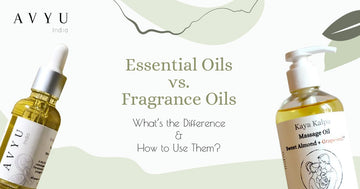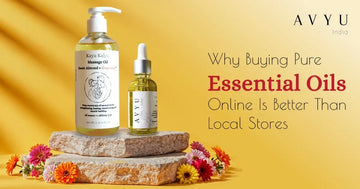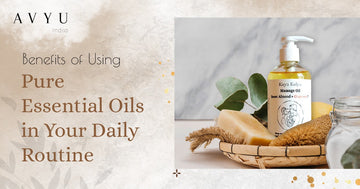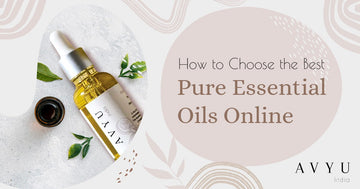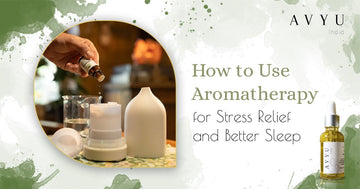Scents play an important role in our daily lives, impacting our moods, emotions, and overall health. Fragrances can be found in everything from perfumes to candles, diffusers, and skincare products. But when it comes to deciding between essential oils and fragrance oils, many individuals are unclear whether to use them and why.
Essential oils and fragrance oils are both used to give perfume to items, but they have quite different compositions, advantages, and applications. In this extensive tutorial, we'll look at the fundamental differences between essential oils and fragrance oils, as well as their benefits, limitations, and the best ways to use them in everyday life.
What Are Essential Oils?
Definition & Composition
Essential oils are natural plant extracts produced by methods such as steam distillation, cold pressing, or resin tapping. These oils capture a plant's true essence, including its fragrance, therapeutic capabilities, and beneficial components.
Sources of Essential Oils
Essential oils are extracted from various parts of plants, including:
-
Flowers – Lavender, Rose, Jasmine
-
Leaves – Eucalyptus, Peppermint, Tea Tree
-
Bark – Cinnamon, Sandalwood
-
Roots – Vetiver, Ginger
-
Fruits – Lemon, Orange, Bergamot
-
Resins – Frankincense, Myrrh
Benefits of Essential Oils
-
Natural and Pure – Free from synthetic chemicals, making them safe for skin, hair, and aromatherapy.
-
Therapeutic Properties – Many essential oils have antimicrobial, anti-inflammatory, and stress-relieving effects.
-
Holistic Healing – Used in Ayurveda, aromatherapy, and traditional medicine for centuries.
-
Mood-Boosting Effects – Scents like lavender and citrus can reduce stress and improve mental clarity.
Common Uses of Essential Oils
-
Aromatherapy – Used in diffusers to promote relaxation and improve air quality.
-
Skincare – Added to creams, serums, and body oils for hydration and skin healing.
-
Haircare – Mixed with carrier oils to promote scalp health and hair growth.
-
Natural Remedies – Used in homemade balms and salves for pain relief and healing.
-
Household Cleaning – Lemon and tea tree oils have antibacterial properties that make them great for cleaning.
What Are Fragrance Oils?
Definition & Composition
Fragrance oils are synthetic or blended oils designed to mimic natural scents or create unique fragrances that do not exist in nature. They are composed of aroma compounds and sometimes include a mix of essential oils and synthetic ingredients.
Types of Fragrance Oils
-
Synthetic Fragrance Oils – Created entirely from chemical compounds to replicate scents like “Ocean Breeze” or “Vanilla Cupcake.”
-
Natural Fragrance Oils – A combination of essential oils and synthetic elements to enhance the fragrance’s longevity.
Benefits of Fragrance Oils
-
Longer-Lasting Scent – More stable and consistent than essential oils, making them ideal for perfumes and candles.
-
Wider Variety of Scents – Allows for the creation of unique fragrances that aren’t available in nature.
-
More Affordable – Less expensive than essential oils, making them more accessible for mass production.
-
Ideal for Home Products – Used in soaps, candles, and body sprays where longevity of scent is important.
Common Uses of Fragrance Oils
-
Perfumes and Body Sprays – Used to create long-lasting personal fragrances.
-
Scented Candles – Provide a consistent and strong scent throw.
-
Room Fresheners and Diffusers – Keeps homes smelling fresh.
-
Soaps and Lotions – Enhances scent appeal in personal care products.
-
Detergents and Cleaning Products – Adds a pleasant scent to household items.
Key Differences Between Essential Oils and Fragrance Oils
|
Feature |
Essential Oils |
Fragrance Oils |
|---|---|---|
|
Source |
Derived from plants, trees, and flowers |
Synthetic or blended (natural + synthetic) |
|
Extraction Process |
Steam distillation, cold pressing |
Chemically formulated or mixed |
|
Scent |
Subtle, natural aroma |
Stronger, longer-lasting scent |
|
Therapeutic Benefits |
Yes, used in aromatherapy and healing |
No medicinal benefits |
|
Longevity |
Evaporates quickly |
Lasts longer in candles and perfumes |
|
Skin Sensitivity |
Can be applied with carrier oils |
May cause irritation if synthetic |
|
Cost |
More expensive due to purity |
More affordable |
|
Environmental Impact |
Biodegradable and sustainable |
May contain artificial chemicals |
How to Choose Between Essential Oils and Fragrance Oils?
When deciding between essential oils and fragrance oils, consider the following factors:
1. Purpose of Use
-
If you want therapeutic benefits, such as stress relief or skin healing → Choose Essential Oils
-
If you need a long-lasting fragrance for candles, soaps, or perfumes → Choose Fragrance Oils
2. Skin Sensitivity
-
Essential oils are natural but still require dilution with carrier oils to prevent irritation.
-
Fragrance oils may contain synthetic ingredients that can cause allergies, so they should be patch-tested before use.
3. Budget Considerations
-
Essential oils are more expensive due to their natural extraction process.
-
Fragrance oils are more budget-friendly, especially for large-scale production.
4. Environmental Impact
-
Essential oils are biodegradable and eco-friendly when sourced sustainably.
-
Fragrance oils may contain artificial chemicals that can be harmful to the environment.
Best Ways to Use Essential Oils and Fragrance Oils
Using Essential Oils
-
Aromatherapy Diffusers – Add a few drops to a diffuser to enhance mood and relaxation.
-
Massage & Skincare – Mix with a carrier oil (like coconut or almond oil) for nourishing skin benefits.
-
DIY Haircare – Add to shampoos or hair masks to promote healthy hair growth.
-
Steam Therapy – Inhale essential oils like eucalyptus to clear congestion.
-
Natural Cleaning Solutions – Use lemon or tea tree oil for homemade cleaning sprays.
Using Fragrance Oils
-
Scented Candles – Add to melted wax for long-lasting home fragrances.
-
Perfumes & Body Mists – Mix with alcohol or carrier oils for custom scents.
-
Room Fresheners & Potpourri – Add to water or dried flowers for a continuous fresh aroma.
-
Soap & Lotion Making – Enhance bath products with unique fragrances.
-
Laundry & Fabric Fresheners – Add a few drops to dryer balls or detergent for fresh-smelling clothes.
Which One Should You Choose?
-
If you are looking for natural, therapeutic benefits → Go for essential oils.
-
If you need a strong, long-lasting fragrance for home or personal products → Choose fragrance oils.
-
If you are sensitive to synthetic ingredients, opt for essential oils.
-
If you want an affordable and versatile option, fragrance oils might be better for your needs.
Both essential oils and fragrance oils have their place in beauty, wellness, and home care. The choice depends on your specific needs, budget, and preferences.
Conclusion
Understanding the distinction between essential oils and fragrance oils empowers you to choose the right option for your specific needs. While essential oils deliver natural therapeutic benefits, promoting wellness and relaxation, fragrance oils provide long-lasting, consistent scents that enhance personal and home care products.
By incorporating them thoughtfully into your routine, you can enjoy the best of both worlds—leveraging the healing properties of essential oils for well-being and the captivating aromas of fragrance oils for an enriched sensory experience. Whether you seek natural remedies or beautifully crafted fragrances, making an informed choice ensures the best results.

